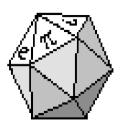Yahoo Answers is shutting down on May 4th, 2021 (Eastern Time) and beginning April 20th, 2021 (Eastern Time) the Yahoo Answers website will be in read-only mode. There will be no changes to other Yahoo properties or services, or your Yahoo account. You can find more information about the Yahoo Answers shutdown and how to download your data on this help page.
Trending News
What non-zero complex analytic functions have all derivatives non-zero, everywhere?
So for every complex number z, f(z)≠0 and all derivatives fⁿ(z)≠=0.
This is a followup to another question:
Hi KB. The condition that all derivatives are also non-zero restricts things somewhat. The second derivative of e^(e^z) is zero at z=πi.
1 Answer
- kbLv 71 decade agoFavorite Answer
Update: Here's a proof in progress (I hope)...
Since C is open (in itself), every zero-free analytic function f(z) has an analytic logarithm.
Thus, f(z) = e^(g(z)) for some analytic g(z) on C.
Note that f' = g' e^g.
Since we want f'(z) ≠ 0 for all z in C, this forces
g'(z) ≠ 0 for all z in C.
Thus, g'(z) = e^(h(z)) for some analytic h(z) on C.
Next, we look at the second derivative.
f'' = (g'' + (g')^2) e^g
= (h' e^h + (e^h)^2) e^g
= (h' + e^h) e^(g+h).
Since we also want f''(z) ≠ 0 for all z in C, we require that
h' + e^h ≠ 0.
---------
Major case:
This is certainly satisfied if h(z) is a nonzero constant
Then, g'(z) = k for some nonzero k in C.
==> g(z) = kz + r for some r in C.
==> f(z) = e^(kz + r) = Ce^(kz) for some nonzero constants C and k.
--
Note that f^(n)(z) = Ck^n e^(kz) is never 0 for all z in C.
Hence, we've found one such family of functions.
==========================
Still to be addressed:
Are there other functions which satisfy h' + e^h ≠ 0 for all z in C which will fit the criteria for this posted question?
(This is certainly false if h(z) = az + b with a ≠ 0.)




